Le Plaisir Blu-ray Movie
HomeLe Plaisir Blu-ray Movie 
Arrow Academy / Blu-ray + DVDArrow | 1952 | 97 min | Rated BBFC: PG | Oct 23, 2017
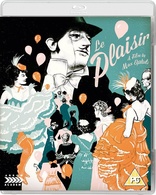
Movie rating
7 | / 10 |
Blu-ray rating
| Users | 4.0 | |
| Reviewer | 4.0 | |
| Overall | 4.0 |
Overview
Le Plaisir (1952)
A doctor, an artist, and a madam appear in vignettes from stories by Guy de Maupassant.
Starring: Danielle Darrieux, Simone Simon, Jean Gabin, Jean Galland, Jean ServaisNarrator: Jean Servais
Director: Max Ophüls
| Foreign | Uncertain |
| Drama | Uncertain |
| Comedy | Uncertain |
Specifications
Video
Video codec: MPEG-4 AVC
Video resolution: 1080p
Aspect ratio: 1.33:1
Original aspect ratio: 1.37:1
Audio
French: LPCM 2.0
Subtitles
English
Discs
Blu-ray Disc
Two-disc set (1 BD, 1 DVD)
DVD copy
Playback
Region B (locked)
Review
Rating summary
| Movie | 4.0 | |
| Video | 4.0 | |
| Audio | 4.0 | |
| Extras | 3.0 | |
| Overall | 4.0 |
Le Plaisir Blu-ray Movie Review
Reviewed by Jeffrey Kauffman December 9, 2017Max Ophüls is one of the more confounding names in the history of 20th century cinema, a man who was regularly recognized within the filmmaking industry as a craftsman and maybe even a genius, but who still nonetheless failed to really register with the public at large, at least in terms of general name recognition. Kind of oddly, considering the esteem in which Ophüls was held professionally, even in the jaded world of Hollywood, Ophüls only ever received two Academy Award nominations, and of those two his only solo nomination not shared with another person was for his work on Le Plaisir. But here’s the thing — you might expect an auteur like Ophüls to receive a nomination for directing (he never did) or writing (his one other nomination was in fact for the screenplay of his 1952 opus, La Ronde, which he shared with co-writer Jacques Natanson, who not so coincidentally also co-wrote Le Plaisir with Ophüls). But the work by Ophüls on Le Plaisir which was recognized by the Academy of Motion Picture Arts and Sciences in their 1955 nominations was for — Best Art Direction / Set Decoration (Black and White), a nod that would seem to put Ophüls in league with other directors who also designed, like William Cameron Menzies or Vincente Minnelli. In some ways Le Plaisir is something of a trifle for Ophüls, a portmanteau of sorts that offers little of the hyperbolic emotionalism or even philosophical subtexts of other Ophüls outings like The Earrings of Madame de..., Lola Montès or Letter from an Unknown Woman, but in a way that may make Le Plaisir a perfect starting point for film lovers not that well acquainted with Ophüls.

The variabilities and even vagaries of “pleasure” unites the three tales of Le Plaisir, stories culled from the works of Guy de Maupassant, an author whose writing has provided an almost insane amount of source material for various filmmakers stretching back to the silent era. None of the trio of stories really pushes the narrative envelope in any meaningful way, but all three provide fascinating insights into character, an Ophüls trademark that helps this inherently trifurcated entry achieve a surprising amount of organic wholeness. The first “episode”, titled Le Masque, is arguably the slightest of the three, depicting the adventures of an apparently young man named Ambroise (Jean Galland), who is something of a lothario who is on the hunt for romantic prospects at a masked ball. His dancing with a coterie of pretty young things surprisingly reduces Ambroise to a quivering out of breath lump, at which point a doctor (Claude Dauphin) is called in to help. It turns out Ambroise is not in fact a young man, but a rather elderly one, a guy trying to literally “cover up” his age to continue his hounddog ways.
There’s a little bit more meat on the bones of the second tale, one entitled Le Maison Tellier, albeit again in the form of wonderfully drawn characters rather than huge sweeping plot mechanics. The titular “house” of this episode’s title is in fact a house of ill repute, run by one Julia Tellier (Madeleine Renaud), who (in that great fashion which is somehow indubitably French) closes her establishment so that she can take her “girls” to a neighboring village where her neice is receiving her first communion. Already this vignette provides Ophüls a chance to cheekily exploit perceptions of “morality”, and in his typically astute way he tends to upend everything, with the supposedly “immoral” Tellier coming off as uniquely grounded in “correct” behavior. The same can’t be said for the regular clientele of Le Maison Tellier, who react with alarm that their favorite establishment has shuttered its doors with no initially apparent reason. Things resolve fairly quickly (and perhaps a bit too uneventfully), with one of Julia's charges, Rosa (Danielle Darrieux), catching the eye of Julia's brother Joseph (Jean Gabin). The entire story is surprisingly sweet, if occasionally a bit tart (some of the interchanges between the men and women are pointed), with an almost fairy tale quality to the proceedings, despite the carnal subtext of it all.
The third story, Le Modèle, is almost like the flip side of O. Henry’s venerable The Gift of the Magi, with a young couple not exactly finding happily ever after and perhaps even giving in to some more selfish tendencies. Jean (Daniel Gélin) is a painter who has either the good fortune or the extreme misfortune (depending on how you view subsequent events) to fall in love with his model, Joséphine (Simone Simon). Instead of finding true love and happiness together, the two grate on each others’ nerves, though one of the interesting things about this portrait (sorry, no pun intended) in quasi-marital discord is that neither partner really comes off as completely honorable. There’s a certain petulant quality to both of these characters that seems to suggest even “pleasure” might not be enough to satisfy them.
Le Plaisir is another cartwheeling ride through Ophüls’ typically peripatetic camera moves. One might reasonably expect the first episode to glide the most freely, being built initially around dance as it is, and while that’s certainly true, the camera never totally quiets down throughout this film. Another really interesting thing to note is how often Ophüls shoots through intermediary objects, as if the viewer is a voyeur peeking in on the crazy antics of these hedonistic characters.
Le Plaisir Blu-ray Movie, Video Quality 
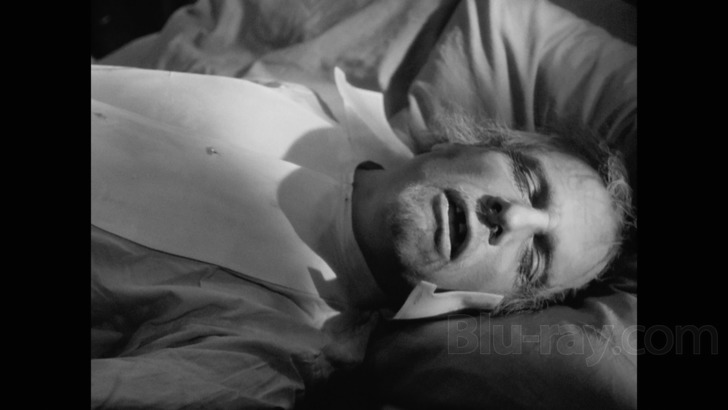
Le Plaisir is presented on Blu-ray courtesy of Arrow Academy with an AVC encoded 1080p transfer in 1.33:1. There's only some fairly generic verbiage in Arrow's insert booklet this time, stating that the film was restored by Gaumont from "original film elements" (the booklet incorrectly states the aspect ratio as 1.37:1, not that there's much difference in that regard). I'm assuming this was sourced from the same Gaumont restoration that provided the source the French release of Le Plaisir, which Svet reviewed for us several years ago. There are some variances in clarity and contrast (the second episode especially, for some reason), but on the whole this is a solid looking transfer that preserves generally deep blacks and well modulated gray scale, while providing an organic accounting of grain. Sharpness and detail levels are also slightly variable at times, though a number of close-ups which aren't part of opticals like dissolves offer rather good fine detail levels. There are no issues with compression anomalies or issue instability.
Le Plaisir Blu-ray Movie, Audio Quality 
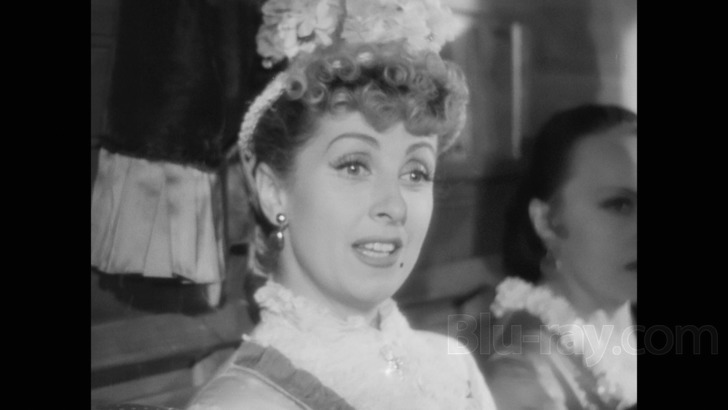
Le Plaisir features an LPCM 2.0 mono track in the original French. As Svet discussed in his review of the French release, there's a certain lack of sonic energy throughout this presentation, but, that said, there are no outright issues with things like distortion. The entire track is simply a bit on the shallow side, but delivers all elements without any real problems. Dialogue, music and effects are woven together well, with good prioritization throughout. The film does feature some narration, which tends to be a bit more present than even some of the dialogue.
Le Plaisir Blu-ray Movie, Special Features and Extras 
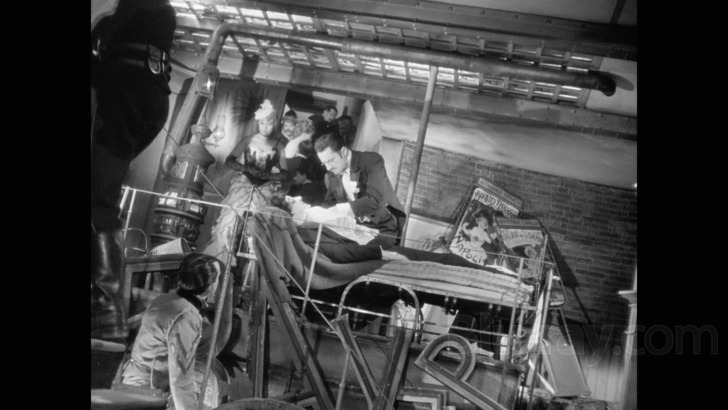
- A Journey Through Le Plaisir (HD; 57:03) is a well done 2002 documentary by Philippe Roger that offers some production data while also visiting some of the locations Ophuls utilized. In French with English subtitles.
- Diary of a Film Shoot (HD; 32:46) is an interview with Ophuls' assistant, Jean Valère. In French with English subtitles.
- Interview with Marcel Ophüls (HD; 13:43) features Ophüls' son, himself a well known filmmaker (The Sorrow and the Pity ). In French with English subtitles.
- Le Plaisir Restored (HD; 6:30) is an appealing if sometimes kind of funny dual interview with Ronald Boullet and Andre Labbouz, two of the restoration experts who worked on the film. Boullet does most of the talking, with Labbouz occasionally interjecting, but keep an eye on Labbouz: he is obviously keeping an eye on the various cameras recording the interview and kind of glares into them repeatedly. In French with English subtitles.
- Theatrical Trailer (HD; 4:16)
Le Plaisir Blu-ray Movie, Overall Score and Recommendation 
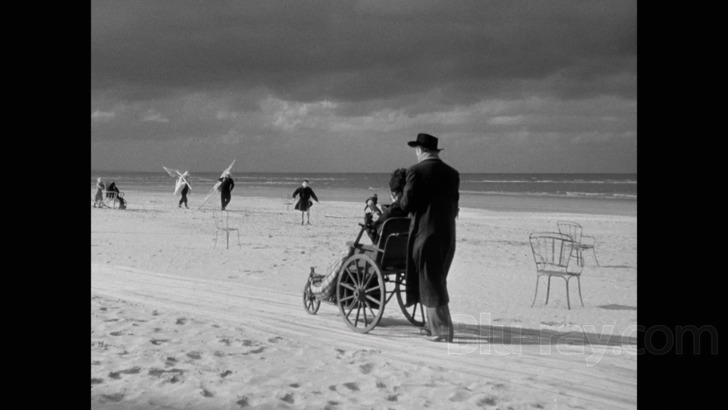
Le Plaisir may not have as much on its cinematic mind as some other pieces by Ophüls, but perhaps that's inevitable given this film's titular focus. Each of the three episodes is charming if occasionally disturbing, and there's a wonderful breeziness to the presentation that helps to lift it over some of its self created melodramatic hurdles. Arrow has assembled a nice package with secure technical merits and good supplements. Recommended.
Similar titles
Similar titles you might also like

Madame de...
The Earrings of Madame de...
1953

The Image Book
Le livre d'image
2018

A Good Marriage
Le Beau Mariage
1982

Out 1
Out 1: Noli me tangere / Out 1: Spectre | Arrow Academy
1971

120 BPM
120 Battements par minute
2017

Let the Sunshine In
Un beau soleil intérieur
2017

Babette's Feast
Babettes gæstebud
1987

Vivre Sa Vie
My Life to Live
1962

Les Misérables
Masters of Cinema
1934

Partie de Campagne
Day in the Country
1946

La Chinoise
Arrow Academy
1967

May Fools
Milou en Mai
1990

Van Gogh
Masters of Cinema
1991

French Cancan
1955

Les Enfants du Paradis
Children of Paradise |Restored Edition | Limited Edition Packaging
1945

Pickpocket
1959

Les Demoiselles de Rochefort
The Young Girls of Rochefort
1967

Girlhood
Bande de filles
2014

Panique
Panic
1946

The Class
Entre les murs
2008